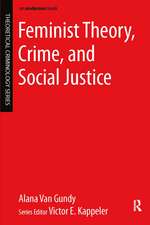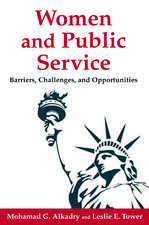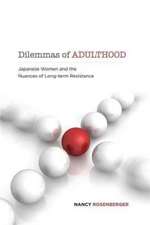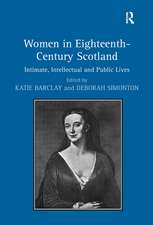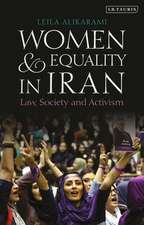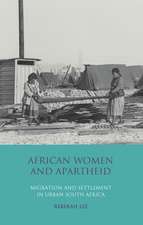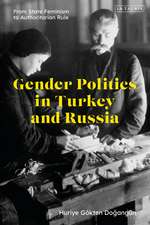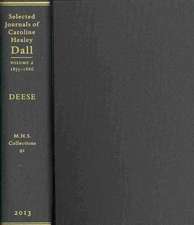Women Under Islam: Gender, Justice and the Politics of Islamic Law
Autor Christina Jones-Pauly, Abir Dajani Tuqanen Limba Engleză Hardback – 28 apr 2011
Preț: 782.53 lei
Preț vechi: 1118.06 lei
-30% Nou
Puncte Express: 1174
Preț estimativ în valută:
149.76€ • 155.77$ • 123.63£
149.76€ • 155.77$ • 123.63£
Carte disponibilă
Livrare economică 24 martie-07 aprilie
Preluare comenzi: 021 569.72.76
Specificații
ISBN-13: 9781845113865
ISBN-10: 1845113861
Pagini: 560
Dimensiuni: 156 x 234 x 51 mm
Greutate: 1.01 kg
Editura: Bloomsbury Publishing
Colecția I.B.Tauris
Locul publicării:London, United Kingdom
ISBN-10: 1845113861
Pagini: 560
Dimensiuni: 156 x 234 x 51 mm
Greutate: 1.01 kg
Editura: Bloomsbury Publishing
Colecția I.B.Tauris
Locul publicării:London, United Kingdom
Notă biografică
Christina Jones-Pauly is an independent consultant on women and governance for various international agencies. She holds a Dr Phil in Comparative and Islamic Laws (London) and a Dr Jur in international law (Harvard). She was Human Rights Fellow at the Radcliffe Institute for Advanced Study, Harvard University, taught Islamic Law at Harvard Law School, and was Associated Researcher at the Socio-Legal Studies Centre, Oxford University. Before this she headed the Human Rights and Development Unit at the University of Bonn. She has worked on numerous human rights projects for the UN. Abir Dajani Tuqan studied Islamic Law at SOAS, and is the first Arab woman to pass the Bar in Britain (Middle Temple), with First Class Honours in Islamic Law. She has spoken at various international conferences and in the media on Islamic family law.
Cuprins
Foreword by The Rt. Hon. Lord Justice ThorpeAcknowledgementsIntroduction1 TUNISIA - THE IDEAL ISLAMIC REFORMIntroductionHistorical rootsModernityModern intellectual reformers of Islamic law - TaalbiAbusive practices against women: dar jawad (house of discipline)Tahar Haddad - successor to TaalbiPre-Independence and reform of ShariaIndependence - equality before the lawPopulation lawInfanticideFundamentalism2 EGYPT - CONSERVATIVE INCREMENTAL REFORMIntroductionArabization and Islamization of Egypt and class stratificationThe modern state - arrival of the EuropeansReform movements in the 19th century on women's rightsReligious reformers: Muhammad AbduhReform movements: Salafiyya, Rashid RidaSecular reform movements: HaykalIslam and the state Court systemsPolitical background since 1952Efforts to codify and reform the law of personal statusReforming the wife's right to divorce - Law No. 1 of 2000Women's CouncilFemale circumcisionConclusions3 PAKISTAN - ORTHODOX MODERNITYHistorical backgroundThe start of IndependenceA Muslim ruler/state - in need of an Islamic law?The 1973 Constitution - basis of applying Islamic lawJudicial review of Islamic lawsJudicial review of the Offence of Zina OrdinanceMay a husband kill a wife or her partner for adultery?Is an honour murder because of zina permissible under any circumstances?Reforming Pakistani Islamic criminalization of laws: honour killings and zinaConclusionsPostscript on the Protection of Women Act 20064 SOUTH AFRICA - CONSTITUTIONAL CHALLENGESFOR ISLAMIC LAWIntroductionA brief history of the Muslim Malay communityIslamic law in South African jurisprudence - the 'Malay' Cape communityThe Muslim Asian Indian communityThe apartheid era and Islamic marriagesSummary of South African jurisprudence on the application of Islamic lawJudicial recognition of Muslim marriages in post-apartheid South AfricaExtra-judicial practices in South African Muslim communitiesExtra-judicial interpretations in the Asian Muslim communities of Islamic marriage and divorce law Inheritance inequality and the South African Constitution - a comparative viewApproaching Islamic succession/inheritance law in a new lightTheological and power disputes within the Muslim communitiesReligious sectsIslamic dispute settlement - extra-judicial conflict resolution in the Muslim communitiesConsiderations for statutory recognition of Muslim marriagesConclusions5 CONCLUSIONSNotesBibliographyIndex


